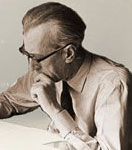Dmitri Kabalevsky
(1904-1987)
 Dmitri Kabalevsky’s name is remembered among a host of twentieth-century Russian composers whose artistry was influenced by life under the Soviet regime. Born in 1904 in St. Petersburg, Kabalevsky’s family moved to Moscow following the Russian Revolution. He attended the Moscow Conservatory from 1925 to 1930, studying piano and composition, and just two years after graduation, began teaching there.
Dmitri Kabalevsky’s name is remembered among a host of twentieth-century Russian composers whose artistry was influenced by life under the Soviet regime. Born in 1904 in St. Petersburg, Kabalevsky’s family moved to Moscow following the Russian Revolution. He attended the Moscow Conservatory from 1925 to 1930, studying piano and composition, and just two years after graduation, began teaching there.
Throughout the 1930s he developed his compositional style, using diatonicism and fairly simple forms, proving to be far more traditional than other composers at the time who were pushing the boundaries.
Several of Kabalevsky’s works rose to popularity such as his Symphony No. 2, the suite from the incidental music for The Comedians, and his first opera, Colas Breugnon. His music did not gain the public’s attention alone though, as his stylistic choices fit within the stringent government guidelines. Working as a music critic, journal editor, and member of the Union of Composers, Kabalevsky avoided much of the distress experienced by other artists, such as Shostakovich and Prokofieff, and became a dominant figure in Soviet music. Lauded for his patriotic songs and battle hymns during the Second World War, his post-war works continued to reflect the standards of “Soviet Realism”.
Kabalevsky additionally established his fame in the field of music education developing a program to teach music to children as well as authoring two books, lecturing, and spending some time teaching in a school. Many of his works were written with young musicians in mind and his piano study-pieces continue to be used worldwide.
Despite conditions for artists in the mid-twentieth century, Kabalevsky found success in a variety of roles. His conventional musical style and loyalty to his county found him favor from the government and recognition throughout his lifetime. The lyricism and expressiveness in his compositions reached the people, as did his work in the field of music education. He left behind a multitude of music including incidental works for the stage and film, several concerti, instrumental solos and chamber pieces, more than two-thirds of which are for piano, vocal and choral music, and orchestral works both without and without chorus.
Click below to view Dmitri Kabalevsky titles:
t7t3l0uhl8|0010C39D6D07|DetailContent|contenttext|D13C172E-EEDC-4AAE-ADD5-FA57EAE01147
<